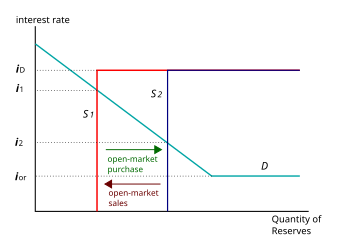
Ryouji Ishizuka (@ISHIZUKA_R)
日銀の金融調節が解りにくい。そこで、望月さんが訳したミッチェル論文にあるNY連銀のグラフを日銀用語に直して作図してみた。日銀に支払う金利(上限)と日銀から受けとる金利(下限)をとのあいだにコリドールを作り、その間でオペで調節、という理解なのだけれどうでしょう。 pic.twitter.com/etoaML1Vay
https://twitter.com/ishizuka_r/status/1237980272894738433?s=21
https://en.wikipedia.org/wiki/Open_market_operation#
Theoretical relationship to interest rates

日銀の金融調節が解りにくい。そこで、望月さんが訳したミッチェル論文にあるNY連銀のグラフを日銀用語に直して作図してみた。日銀に支払う金利(上限)と日銀から受けとる金利(下限)をとのあいだにコリドールを作り、その間でオペで調節、という理解なのだけれどうでしょう。 pic.twitter.com/etoaML1Vay
Classical economic theory postulates a distinctive relationship between the supply of central bank money and short-term interest rates: like for a commodity, a higher demand for central bank money would increase its price, the interest rate. When there is an increased demand for base money, the central bank must act if it wishes to maintain the short-term interest rate. It does this by increasing the supply of base money: it goes to the open market to buy a financial asset, such as government bonds. To pay for these assets, new central bank money is generated in the seller's loro account, increasing the total amount of base money in the economy. Conversely, if the central bank sells these assets in the open market, the base money is reduced.
Technically, the process works because the central bank has the authority to bring money in and out of existence. It is the only point in the whole system with the unlimited ability to produce money. Another organization may be able to influence the open market for a period of time, but the central bank will always be able to overpower their influence with an infinite supply of money.[3]
Side note: Countries that have a free floating currency not pegged to any commodity or other currency have a similar capacity to produce an unlimited amount of net financial assets (bonds). Understandably, governments would like to utilize this capacity to meet other political ends like unemployment rate targeting, or relative size of various public services (military, education, health etc.), rather than any specific interest rate. Mostly, however the central bank is prevented by law or convention from giving way to such demands, being required to only generate central bank money in exchange for eligible assets (see above).
公開市場操作 - Wikipedia
公開市場操作
公開市場操作(こうかいしじょうそうさ、英語: Open Market Operation)とは、金融市場で、中央銀行が国債や手形などの有価証券を売買することによって、マネタリーベースの量を操作しマネーサプライや金利を調整する金融政策の一手段。単に「オペレーション」あるいは略して「オペ」とも呼ばれる。
- 売りオペレーション[⇦]
- 中央銀行が銀行に国債などを売ることを言う。代金が銀行から中央銀行に支払われ、通貨量が減る。
- 買いオペレーション[⇨]
- 中央銀行が銀行から国債などを買うことを言う。代金が中央銀行から銀行に支払われ、通貨量が増える。景気の低迷で金融市場への資金供給量が少なくなった時や、海外の金融状態が不安定であると言った理由で国内銀行が海外金融機関への資金供給を渋る事で資金供給量が少なくなった時に行われる。供給量が増えることで金利を下げる効果がある。供給量が多くなる事で金融機関は資金調達ができ、金融機関は調達した資金を企業や個人に供給する為、金融緩和に似た効果がある。なお、購入代金は取引を仲介している銀行の日銀当座預金に振り込まれる。
民間金融機関は日銀の要求を必ずしも受け入れる必要は無く、判断は民間金融機関がする。

Open-Market-Operations-(OMO)-1


0 件のコメント:
コメントを投稿